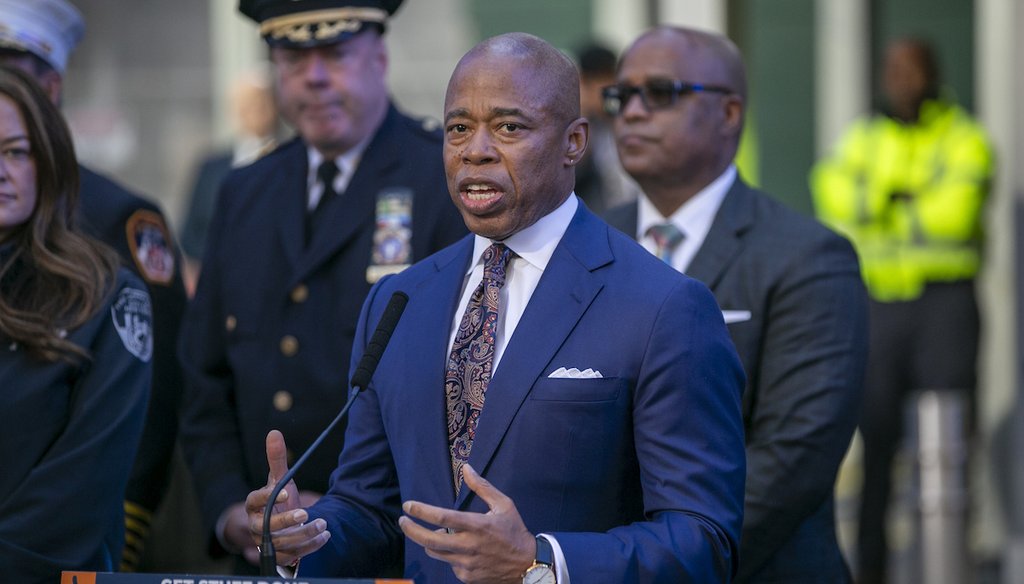



New York City Mayor Eric Adams is in Times Square in New York City for a news conference about New Year's Eve security on Dec. 30, 2022. (AP Photo)
The 2% of New York City tax filers with the highest incomes pay half of all of the city’s collections of personal income taxes.
There is no data to show how much these rich New Yorkers pay in other taxes, such as real estate or sales taxes.
Personal income taxes represent 22% of city tax collections.
On the "Cats Roundtable," a radio show and podcast with businessman and political donor John Catsimatidis, New York City Mayor Eric Adams made a claim about the richest New Yorkers’ contributions to city coffers.
"Fifty-one percent of our taxes are paid by 2% of New Yorkers," Adams said. "We must understand the role that high-income New Yorkers play in this city. And when I hear people totally attempting to say they don’t play a significant role, that is just wrong, they do."
Is Adams right?
We reached out to his press secretary, Fabien Levy, who said Adams was talking specifically about personal income taxes.
During the interview, Adams was not so precise. The mayor, however, has made that qualification when making this claim before, such as when he was running for office in 2021.
This is what he said at a fundraising appearance in October 2021: "Yeah, we’re over 8 million people. But do you know 65,000 pay 51 percent of our income taxes?"
Levy provided previously unreleased data from the Mayor’s Office of Management and Budget, which showed that in 2020, the top 2.5% of city taxpayers, when ranked by income, paid 51.6% of the city’s personal income tax collections.
According to a report released in December 2022 from the city’s Independent Budget Office, a publicly funded organization that provides nonpartisan information about city finances, in 2020, filers with annual gross income of $500,000 or more, representing 1.6% of all filers, paid 49.2% of the city’s personal income taxes.
Independent Budget Office Communications Director Elizabeth Brown confirmed the office estimated Adams’ claim to be true, but only as it pertains to personal income tax collections -- not all tax collections.
"We don’t break out the groups the same exact way the mayor spoke about them, but we believe his numbers are more or less accurate," Brown said.
Personal income taxes are a fraction of what the city collects in taxes. According to the city’s January 2023 financial plan, personal income and the pass-through entity tax (an optional tax for partnerships and S corporations, such as limited liability corporations) represent 22% of the city’s collections. Property taxes constitute 46% of the collections, while sales and use taxes represent 13%.
Lucy Dadayan, an expert in state and local finances at the Urban-Brookings Tax Policy Center at the Urban Institute, said that it’s not surprising that a small fraction of earners pay nearly half of the city’s income taxes. That’s because about 2.1% of New York city’s earners take home around 43% of New York City’s income, she said. This data point is nearly exact to data provided by the city from the Office of Management and Budget.
The available data doesn’t show how much the top 2% of city earners pay on property, sales, or other taxes, Dadayan said.
But their contributions to other tax categories are significant, said Nicole Gelinas, a senior fellow at the conservative Manhattan Institute who frequently writes about city finances. According to the city, office buildings are 21% of the property tax levy, the city’s single biggest tax, for example, and the reason the office valuations are high is because of their wealthy occupants, Gelinas said. Wealthier people also consume more in goods and services than middle-class and poorer people, and thus pay higher sales taxes, she said.
Adams claimed that 51% of city taxes are paid by 2% of New Yorkers.
If he had specified income taxes in his statement, we would have given a True ruling.
The budget analysts who study the numbers confirm as much.
The mayor was talking about personal income taxes, his spokesperson said.
But someone listening to Adams’ interview would not necessarily have known that because Adams did not offer that qualification.
Given his past similar statements in which he specified it was income taxes he was talking about, we do not see this as a case in which he was trying to mislead the audience.
But because his statement on the radio show was accurate but needed clarification, we rate his statement as Mostly True.
John Cats Roundtable, interview with New York City Mayor Eric Adams, via SoundCloud, Jan. 7, 2023.
U.S. Census Quick Facts, population estimates July 1, 2021, New York City.
Email interview, Mayor Eric Adams press secretary, Fabien Levy, Jan. 13, 18, 2023.
Email interview, Chloe P. Chik, press secretary, New York City Comptroller Brad Lander, Jan. 12, 2023.
Email interview, Elizabeth Brown, spokesperson, New York City Independent Budget Office, Jan. 12, 2023.
Email interview, Nicole Gelinas, senior fellow, Manhattan Institute, Jan. 13, 2023.
Email interview, Lucy Dadayan, senior research associate, Urban-Brookings Tax Policy Center at the Urban Institute, Jan. 14, 2023.
New York Post, "Eric Adams says he’s concerned about wealthy New Yorkers fleeing city," May 9, 2021.
NYC.gov, "Transcript: Mayor Eric Adams Appears on 77 WABC's ‘Cats at Night’, Jan. 6, 2023.
New York City Independent Budget Office, "Highlights from IBO’s Updated Tables on
New York City Residents’ Income & Income Tax Liability in 2020," December 2022.
New York City Independent Budget Office, Personal Income Tax data, 2020.
Politico, "Adams keynotes fundraiser for new PAC formed to support like-minded politicians," Oct. 18, 2021.
In a world of wild talk and fake news, help us stand up for the facts.
